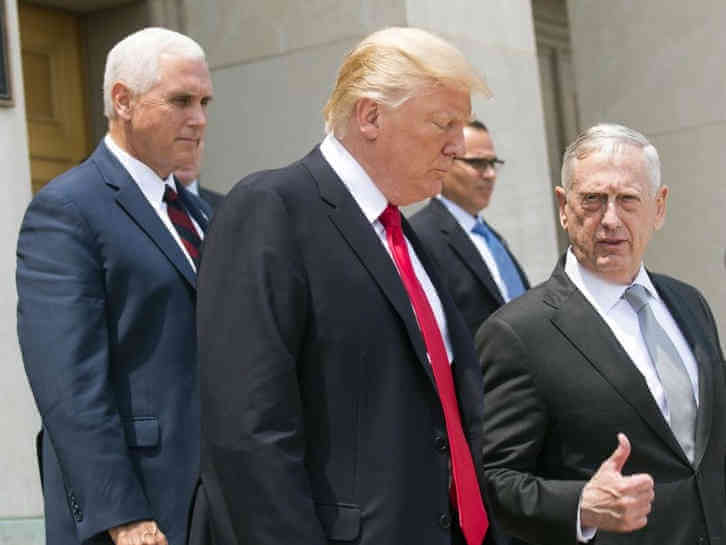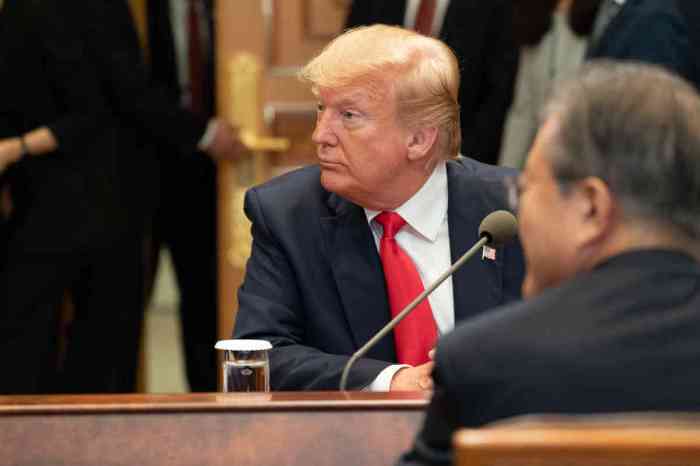Two federal district judges and a US magistrate judge have issued new rulings — largely adverse to the government — in lawsuits challenging the Trump administration’s policy to ban military service by transgender individuals.
After the San Francisco-based Ninth Circuit Court of Appeals refused to lift Seattle District Judge Marsha Pechman’s preliminary injunction against the policy on July 18, she issued a new ruling on July 27 granting the plaintiffs’ motion to compel discovery and denying the government’s motion for a protective order that would shield President Donald Trump from having to respond to any discovery requests.
The Justice Department immediately announced it would appeal this ruling to the Ninth Circuit. Pechman had previously denied motions for summary judgment in the case, having found that there was a need for discovery before such a ruling could take place.
On August 6, DC District Court Judge Colleen Kollar-Kotelly, who had issued the first preliminary injunction against the policy last year, issued two decisions. In one, she rejected the government’s request to vacate her preliminary injunction against Trump’s plan announced last summer as moot since Defense Secretary James Mattis, in February, sent the president a memo outlining a “new” policy. Kollar-Kotelly agreed with Pechman that the “new” policy is not essentially different from the “old” one Trump had articulated.
Kollar-Kotelly did, however, grant the government’s motion to dismiss Trump as an individual named defendant in the case.
And, on August 14, Magistrate Judge A. David Copperthite, to whom Baltimore District Judge Marvin J. Garbis had referred discovery matters in Stone v. Trump, another one of the pending cases, issued a ruling granting in part the plaintiffs’ motion to compel discovery of deliberative materials in Trump and Mattis’ development of the new policy the administration is seeking to implement.
Garbis has other motions to rule on in the case in Baltimore, and another suit challenging the proposed transgender ban is pending in federal district court in Riverside, California, where the judge is considering motions similar to those filed with Judges Pechman, Kollar-Kotelly, and Garbis.
To recap for those coming late to this story, Trump tweeted a ban on transgender military service on July 26, 2017, and issued a memorandum a month later describing the policy in slightly more detail, tasking Secretary Mattis to propose a plan for implementation by late February 2018, with the goal of implementing the policy by March.
Trump’s memo specified that Mattis’ previous directive to allow transgender applicants to join the military effective January 1, 2018, was to be indefinitely delayed, since the president’s policy would not allow transgender people to enlist. When Trump issued his memo, Mattis announced that no action would be taken against current transgender personnel pending implementation of a new policy, but there were reports of trans service members seeing promotions and desired assignments canceled, as were some planned medical procedures.
Mattis’ memo to the president in February proposed some modifications to the policy Trump put forward last August. Trans personnel who were already serving and had transitioned and were “stable” in their preferred gender would be allowed to continue serving, based on a determination that the investment in their training outweighed whatever “risk” they posed to military readiness. Trans individuals who had not transitioned or been diagnosed with “gender dysphoria” would be allowed to enlist and serve, provided they refrained from transitioning and served in the gender identified at birth. Otherwise, those diagnosed with “gender dysphoria” would be prohibited from enlisting or serving, and those who could not comply would be discharged.
The Mattis proposal was based on a “finding” — from a rigged special committee dominated by committed opponents of transgender service — that allowing trans people to serve in the military is harmful to the operational efficiency of the service. This conclusion was based on no factual evidence and oblivious to the fact that transgender people had been serving openly without any problems since the Obama administration lifted the prior ban at the end of June 2016. It also flew in the face of Pentagon conclusions that were the basis of the Obama policy change.
Four lawsuits had been filed in response to the summer 2017 policy announcement, and in a matter of months the four district courts had issued preliminary injunctions, having found it likely the plaintiffs would prevail on their argument that the policy violates the Fifth Amendment’s Equal Protection requirements. Given these injunctions, the Defense Department allowed trans people to submit applications to enlist beginning on January 1 of this year, after losing a last-ditch court battle to continue the enlistment ban. There have been reports, however, that the applications received are getting very slow processing, and all indications are that few have been accepted for service.
Trump responded to Mattis’ February 2018 memo by “withdrawing” his prior memo and tweet and authorizing Mattis to adopt the implementation plan he recommended. The Justice Department then filed motions in all the lawsuits seeking to lift the preliminary injunctions. Their argument was, in part, that the “new” policy was sufficiently different from the one that had been “withdrawn” as to moot the lawsuits. They further contended that the plaintiffs who were already serving and would be allowed to continue serving under the “new” policy no longer had standing to challenge the policy in court. And Justice argued that the plaintiffs’ attempts to conduct discovery in the case should be put on hold until there was a definitive appellate ruling on the government’s motion to lift the preliminary injunctions.
On April 13, Judge Pechman rejected the government’s motion to lift the preliminary injunction, having already ordered that discovery proceed. In his initial tweet, Trump claimed he had consulted with generals and other experts before adopting the policy, but the identities of these people were not revealed and the government — making generalized claims of executive privilege — has stonewalled any attempt to discover their identities or any internal executive branch documents that might have been generated on this issue.
Similarly, the February memorandum released under Mattis’ name did not identify any individuals responsible for its development, and naturally the plaintiffs are also seeking to discover who was involved in putting it together and what information they purported to rely upon.
Pechman’s July 27 order to compel discovery specified the materials sought by the plaintiffs, and pointed out that under evidentiary rules any claim of executive privilege against disclosure is subject to evaluation by the court.
“The deliberative privilege is not absolute,” she wrote. “Several courts have recognized that the privilege does not apply in cases involving claims of governmental misconduct or where the government’s intent is at issue.”
Under Ninth Circuit precedents governing Pechman’s decision-making, the question is whether plaintiffs’ need for the materials and for accurate fact-finding overrides the government’s interest in non-disclosure. Factors involved in making that determination include the relevance of the evidence, the availability of other evidence, the government’s role in the litigation, and the risk that disclosure would hinder frank and independent discussion regarding contemplated policies and decisions. In invoking privilege, the government must “provide precise and certain reasons for preserving the confidentiality of designated material.”
Pechman had previously determined that discrimination because of gender identity involves a “suspect classification” regarding the Constitution’s requirement of equal protection, which means the government has the burden of proving that there is a compelling justification for the discrimination. Here, however, the government has articulated only a generalized judgment that service by transgender individuals is too “risky” based on no facts whatsoever. Pechman concluded in granting the plaintiffs’ discovery motion that “the deliberative process privilege does not apply in this case.”
The government had moved for a protective order “precluding discovery directed at President Trump.” Even though the government conceded that Trump has “not provided substantive responses or produced a privilege log” listing specifically what information has to be protected against disclosure, the Justice Department contended that “because the requested discovery raises ‘separation of powers concerns,’” the plaintiffs must “exhaust discovery ‘from sources other than the President and his immediate White House advisors and staff’ before he is required to formally invoke the privilege.”
Pechman noted that so far the government has refused to provide any information about how the policy decision was made and has failed to identify the specific documents and other information for which it claims privilege. In a footnote, she commented, “The Court notes that Defendants have steadfastly refused to identify even one general or military official President Trump consulted before announcing the ban.” As a result, she found, there was no basis for her to evaluate “whether the privilege applies and if so, whether Plaintiffs have established a showing of need sufficient to overcome it.”
Indeed, in a prior decision, Pechman concluded as far as the record stands, it looks as if Trump made the whole thing up himself without relying on any military expertise. From that perspective, she has preliminarily rejected the government’s contention the policy is owed the deference normally extended to military policies adopted based on the specialized training and expertise of Pentagon policy-makers.
Judge Kollar-Kotelly’s August 6 ruling focused on an issue that Pechman had previously decided: whether the plaintiffs had standing to continue challenging the policy after Mattis’ memo supplanted the “withdrawn” earlier policy announcements. She had little trouble determining that all the plaintiffs — even those currently serving who would be allowed to continue serving under the “new” policy — still had standing, which requires a finding that implementing the policy would cause them harm.
“The Court rejects Defendants’ argument that Plaintiffs no longer have standing because they are not harmed by the Mattis Implementation Plan,” Kollar-Kotelly wrote, stating that “the effect of that plan would be that individuals who require or have undergone gender transition would be absolutely disqualified from military service, individuals with a history or diagnosis of gender dysphoria would be largely disqualified from military service, and, to the extent that there are any individuals who identify as ‘transgender’ but do not fall under the first two categories, they would be allowed to serve, but only ‘in their biological sex’ (which means that openly transgender persons would generally not be allowed to serve in conformance with their identity).”
In addition, those who have transitioned and are now serving would be doing so under the stigma of being labeled as “unfit” for military service and presenting an undue risk to military readiness, and would likely suffer prejudice regarding assignments and their treatment by fellow service members, as well as emotional harm.
“The Mattis Implementation Plan sends a blatantly stigmatizing message to all members of the military hierarchy that has a unique and damaging effect on a narrow and identifiable set of individuals, of which Plaintiffs are members,” Kollar-Kotelly wrote. They would be serving “pursuant to an exception to a policy that explicitly marks them as unfit for service. No other service members are so afflicted. These Plaintiffs are denied equal treatment because they will be the only service members who are allowed to serve only based on a technicality; as an exception to a policy that generally paints them as unfit.”
She pointed out that beyond stigmatization, the Mattis plan “creates a substantial risk that Plaintiffs will suffer concrete harms to their careers in the near future. There is a substantial risk that the plan will harm Plaintiffs’ career development in the form of reduced opportunities for assignments, promotion, training, and deployment. These harms are an additional basis for Plaintiffs’ standing.”
Kollar-Kotelly rejected the government’s contention that these harms were only “speculative.”
Agreeing with Judge Pechman, she rejected the claim that Trump’s “withdrawal” of his August 2017 memorandum and the substitution of the Mattis plan made the existing lawsuits moot, finding that the “new” plan was merely a method of “implementing” the previously announced policy. The Mattis plan, like the policy Trump announced last August, “prevents service by transgender individuals,” and the minor deviations from the complete categorical ban were not significant enough to make it substantially different, Kollar-Kotelly concluded.
Kollar-Kotelly did, however, grant the government’s motion to partially dissolve the injunction as it applies personally to Trump, and granted the motion to “dismiss the President himself as a party to this case.” Should the plaintiffs prevail on the merits, an injunction aimed at the Defense Department’s leadership preventing the policy from taking effect will provide complete relief, she pointed out.
The plaintiffs had complained that removing Trump from the case as a defendant would undermine their attempt to discover the information necessary to make their case, but the judge wrote that “it would not be appropriate to retain the President as a party to this case simply because it will be more complicated to seek discovery from him if he is dismissed. To the extent that there exists relevant and appropriate discovery related to the President, Plaintiffs will still be able to obtain that discovery despite the President not being a party to the case.”
In the Baltimore case, Magistrate Judge Copperthite this week issued a ruling granting in part the plaintiffs’ motion to compel discovery of deliberative materials regarding Trump’s July 2017 tweet, his August 2017 memorandum, the “activities of the DoD’s so-called panel of experts and its working groups” who put together the memorandum ultimately submitted by Mattis to the president in February, and deliberative materials regarding that Implementation Plan and the president’s subsequent March memorandum, “including any participation or interference in that process by anti-transgender activists and lobbyists.”
Copperthite, noting that a motion is pending before Judge Garbis to dismiss Trump as a defendant in the case, declined to rule on the government’s request for a protective order that would shield the president from having to respond to discovery requests directed to him, “pending the resolution of the motion” before Garbis. Cooperthite wrote that “no interrogatories or document requests will be directed to President Trump as a party, but may be directed to other parties pursuant to this Memorandum Opinion. If the Motion to Dismiss is denied, the Court will revisit the issue of the protective order as to President Trump.”
Cooperthite faced a practical dilemma in dealing with the government’s requests to shield Trump from discovery.
“On July 27, 2017, President Trump tweeted transgender persons would no longer be able to serve in the military and as for any deliberative process, simply stated this policy occurred after consulting with ‘my Generals and military experts,’” he wrote. “There is no evidence to support the concept that ‘my Generals and military experts’ would have the information Plaintiffs request. There is no evidence provided to this Court that ‘my Generals and military experts’ are identified, in fact do exist, or that they would be included in document requests and interrogatories propounded to the Executive Branch, excluding the President. By tweeting his decisions to the world, the President has, in fact, narrowed the focus of Plaintiffs’ inquiries to the President himself. The Presidential tweets put the President front and enter as the potential discriminating official.”
Cooperthite, here, is raising the real question as to whether discovery that doesn’t include Trump is at all meaningful, since the ultimate legal question in the litigation is the intent of the government in adopting the ban which is, at bottom, the president’s intent. On the other hand, discovery directed at Trump raises serious questions about separation of powers and the traditional respect for the confidentiality of internal White House policy deliberations, as Kollar-Kotelly noted in her ruling.
“So many factors are unknown at this juncture in the litigation,” wrote Copperthite. “It is unknown whether Plaintiffs can obtain the information necessary from the non-Presidential discovery to define the ‘intent’ of the government with respect to the transgender ban. Defendants offer as an alternative, a stay of discovery with respect to the President, until the Motion to Dismiss the President as a party is decided. If the President, as the discriminating official, tweeted his transgender ban sua sponte as alleged, this Court sees no alternative to obtaining the intent of the government other than denying the protective order with respect to President Trump.”
However, he wrote, precedents “instruct this Court to give deference to the executive branch because ‘occasions for constitutional confrontation between the two branches should be avoided whenever possible.’”
So Copperthite decided to put off deciding the protective order issue until after Judge Garbis decides whether to dismiss Trump as a party, but for now will order the defendants only to comply with discovery requests directed to defendants other than Trump, Secretary Mattis, and the secretaries of the individual military branches.
The possibility that Trump will be ordered to submit to questioning under oath in at least one of these cases remains a reality, but any attempt by the plaintiffs to do so would undoubtedly arouse spirited opposition from the Defense Department, officially based on claims of privilege, but realistically due to the likelihood that Trump would perjure himself under such questioning. Recall the historical precedent: The House of Representatives voted to impeach President Bill Clinton based, in part, on the charge that he committed perjury during questioning before a grand jury by the special counsel investigating his affair with Monica Lewinski. At least in that case, the House considered presidential perjury to be an impeachable offense.
Plaintiffs in the Seattle case, Karnoski v. Trump, in which the president remains a defendant, are represented by Lambda Legal and pro bono attorneys from Kirkland & Ellis. Plaintiffs in the DC case, Jane Doe 2 v. Trump, are represented by the National Center for Lesbian Rights, GLBTQ Legal Advocates & Defenders (GLAD), and pro bono attorneys from Wilmer Cutler Pickering Hale & Dorr LLP and Foley Hoag LLP. Plaintiffs in the Baltimore case, Stone v. Trump, are represented by the American Civil Liberties Union, the ACLU of Maryland, and pro bono attorneys from Covington & Burling LLP.




































